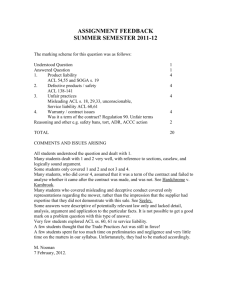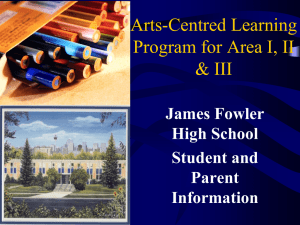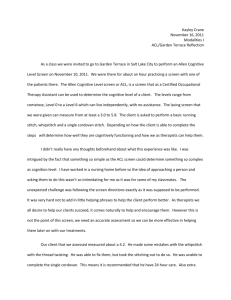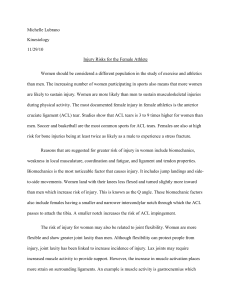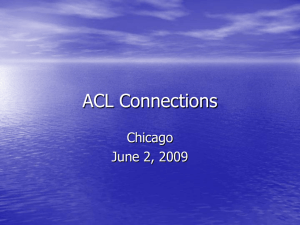ACL annual conference - Learning and Work Institute Wales
advertisement
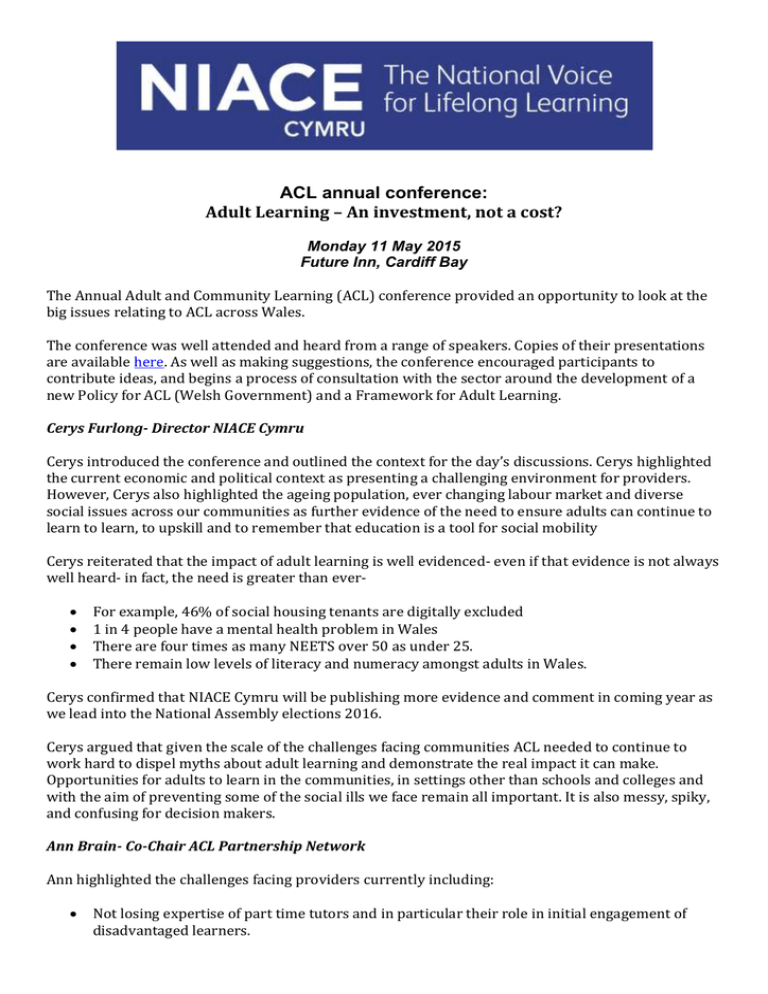
ACL annual conference: Adult Learning – An investment, not a cost? Monday 11 May 2015 Future Inn, Cardiff Bay The Annual Adult and Community Learning (ACL) conference provided an opportunity to look at the big issues relating to ACL across Wales. The conference was well attended and heard from a range of speakers. Copies of their presentations are available here. As well as making suggestions, the conference encouraged participants to contribute ideas, and begins a process of consultation with the sector around the development of a new Policy for ACL (Welsh Government) and a Framework for Adult Learning. Cerys Furlong- Director NIACE Cymru Cerys introduced the conference and outlined the context for the day’s discussions. Cerys highlighted the current economic and political context as presenting a challenging environment for providers. However, Cerys also highlighted the ageing population, ever changing labour market and diverse social issues across our communities as further evidence of the need to ensure adults can continue to learn to learn, to upskill and to remember that education is a tool for social mobility Cerys reiterated that the impact of adult learning is well evidenced- even if that evidence is not always well heard- in fact, the need is greater than ever For example, 46% of social housing tenants are digitally excluded 1 in 4 people have a mental health problem in Wales There are four times as many NEETS over 50 as under 25. There remain low levels of literacy and numeracy amongst adults in Wales. Cerys confirmed that NIACE Cymru will be publishing more evidence and comment in coming year as we lead into the National Assembly elections 2016. Cerys argued that given the scale of the challenges facing communities ACL needed to continue to work hard to dispel myths about adult learning and demonstrate the real impact it can make. Opportunities for adults to learn in the communities, in settings other than schools and colleges and with the aim of preventing some of the social ills we face remain all important. It is also messy, spiky, and confusing for decision makers. Ann Brain- Co-Chair ACL Partnership Network Ann highlighted the challenges facing providers currently including: Not losing expertise of part time tutors and in particular their role in initial engagement of disadvantaged learners. Progression- how can learners from ACL progress on to colleges where part time FE is declining Recognize the successes in changing sector- Full cost recovery and self organized clubs. Which learners are missing? Is there too much focus on those closest to the labour market-what about those furthest away? How do we address the older NEETs issue A copy of Ann’s presentation is available here Huw Morris- Director of Skills, Higher Education and Lifelong Learning, Welsh Government Huw argued that the challenge going forward is increasing demand for public services and declining resources. Huw highlighted areas that need further consideration including: Learning from (and reflecting on) the Festival Of Dangerous Ideas and suggestions for new ways of working that came forward. Key points from Learning Through life- particularly rebalancing funding across the life stages. CQFW- challenge to find systematic way of using this across the sector There has been an improvement in qualification levels of adults in Wales, including halving of those with no qualifications at all. Family and household is important in terms of the impact on others- and the spin off benefits. Why do people choose to learn- where is the evidence of this? Could/ should they learn for other reasons? Would they learn if this difference was made? If we believe that education is a route into education, work etc we have to be honest about what we deliver and what is successful Rich history and current diversity of adult learning in Wales. Workplace learning, GE, ACL, OU, Universities, Voluntary, self directed. However the range and offer is complex and it’s not clear how the bits join up- further work needed here. Declining numbers of learners in LA ACL even before the funding across the board was reduced. Proportion of decline between full and part time comes into play.. but overall volume of learning has increased What is the impact of new technologies on learning- ways of learning, numbers of learning etc Sector need to engage fully in mapping out future direction A copy of Huw’s presentation is available here Kevern Kerswell- Coleg Cambria & co-chair of the ACL Partnership Network Kevern’s presentation concentrated on the development of a new Framework for Adult Learning, highlighting key points including: 2010 strategic policy provided some direction to the sector and did help raise the profile of ACL, now time to build on this Moving towards a new ACL policy needs to be aligned to a new coherent Adult Learning Framework. This could be based on Donaldson Review four principles, replacing children and young people with ADULTS. Need to look at the associated research and good practice- e.g. NIACE citizens Curriculum and the Youth engagement gateway A copy of Kevern’s presentation is available here Panel Discussion The panel included: Dr Julie Bishop- Public Health Wales. Sioned Hughes- Community Housing Cymru Liam Kealy- Estyn Eleanor Marks- Communities First, Welsh Government. Huw Morris- Welsh Government The panel highlighted areas of key focus and took a number of questions from the floor. Key points included: Impact of Welfare Reform on members of housing associations/ and broader public. This has made the housing sector realize it needs to collaborate with other organisations and sectors (to the benefit of its tenants). Issues include-What life skills do tenants need to maintain their tenancies; creating opportunities for tenants to be able to work. Also consider role of housing sector as a huge procurer, as well as a landlord- so wants to upskill tenants to take those jobs More direction needed from senior WG staff to oil the wheels of partnerships to enable collaboration at a local level. Link between health and education with common goal of keeping people as healthy as possible. o Prudent patient- participation in their own healthcare, basic skills issues. o People as active partners in looking after their families health. o Routes into employment in the health sector o Having a meaningful purpose in life- is so important, participation in community learning and activity and positive impact on health and wellbeing o Workforce in health-using entire workforce to greater effect. Those on frontline, are well placed to have those conversations with patients. Making every contact count. Community Assets and shared services- creating the environment for us to share ideas, best practice and crucially understanding of what is needed to design services Future of public services- need to keep apace with private sector in terms of use of technology, including smartphones Government needs to see return on its investment- we need to calculate the impact of investment in learning for adults. Round table discussion: Session one Tables were asked to consider the questions below. All feedback was collated and shared with Welsh Government officials drafting new policy for ACL: Morning Discussion 1. Are adult numeracy, literacy, ESOL and digital literacy the right focus for DfES funded provision? These should be the funded core of the curriculum but should also include ‘skills’ related courses to address poverty/ employment needs Need to capture/ co-ordinate engagement either within ACL or community first but it must be there Concerns were expressed that restrictions would make class groups unviable Some suggested that DfES should fund any programme being deliver in the community (i.e make ACL location specific) Yes however, not every learner will have basic skills needs, but ACL should be able to help them progress into learning- so there needs to be a balance to enable providers to support/ steer those learners into appropriate provision (perhaps 80/20, or equivalent?) Funding should be used more appropriately to link up other WG programmes- for example if (non ACL)funding is used to support childcare, providers must ensure that if a learner signs up for ACL provision Underpinning the thematic focus there should be a reform of the funding allocations across Las to reflect need better Guidelines need to include embedded literacy, numeracy and digital skills Literacy, numeracy, ESOL & digital skills need to be included but we also need to see the bigger picture in the more global impact of why these areas- for example the impact of being literate/ digitally literate on health There is no provision in ACL for engagement- this either needs to be included or a proper link up with Communities First enabled- this would require clearer direction across Communities First on what they can/ should deliver under the learning pillar, and how to commission/ progress onto ACL 2. What else should the Government fund and why? a. Which courses? Engagement activity Employability questions No specific course, need flexibility to respond to local need Family learning Food Hygiene Public health courses Courses that improve mental health and well-being Skills related courses to address poverty or enable progressions towards employment b. At what level? E1-L2, but may be an exception through partnership to L3 Need to be responsive to community and learner need, so not prescriptive Up to level 2 L2 c. Specific learners? Family learning Fund more non- communities first as an infill at marginal cost Driven by needs to learners to engage, re-engage, progress both in terms of society and employment Aged 19+ Re-skilling for older people- particularly those at risk of exclusion (social or digital) Active engagement for older people d. Other? Barriers to learning such as childcare, transport, carers needs to attend learning Training for staff- all staff in ACL need to be appropriately qualified (whoever employs them) and especially if delivery the key curriculum of literacy, numeracy etc Issues around family learning seem to be fragmenting things rather than joining them up 3. What progressions routes have been used by learners Teacher training programmes Into WEA Into FE Access to HE HE Widening access programmes Tailor made programmes for WBL ACL needs to be recognised as an important stepping stone for many learners prior to going to college/ into work Enables learners to join and leave an escalator or learning to meet their needs Perhaps the focus should be to support progression in community to L2 4. What impact will wider reductions in part time provision have for progression? There will be fewer opportunities for training, retraining and shifting between jobs There is the risk of gaps in the escalator of progression and risk of engaging learners, supporting progression and raising expectations that cannot be met We want to raise aspirations and skills- and meet individual learning needs in the community We are endeavouring to up-skill the adult workforce, but there is a reduction in opportunities for them to progress 5. Other comments The new policy needs to say something about the balance between what WG funds, and what else is being delivered. For example, could the 80/20 split be included to encourage selfdirected learning. The above steer from WG would need to apply to ALL providers (including FEIs) Round table discussions: Session two 1. What positive steps have partnerships taken to manage change and work effectively? Using Communities First as an effective engagement tool, and progressing onto ACL Communities First providing initial step into learning/ confidence building No problems getting providers to come together in partnership, but without funding to support activities it’s difficult to see how Government policy will be implemented. Partnership take a strategic direction, joining up public funding including Communities First, Europe, ACL Grant, DWP programme and project funding. Looking at alternative funding routes, particularly ESF. The Partnership Co-ordinator role (where it exists) is vital. Sharing costs across partners (economies therefore derived)- E.g RCT LA Shared posts across partnerships- common employment terms and conditions, CPD (e.g. CAV) Learning to “run a business” has been challenging for some- but now offer a varied programme of full cost recovery and basic skills Jointly managing services (e.g. Merthyr) across Communities First, ACL, Families First- valuing progression and rewarding it. Recognising the different roles each provider contribute to the final outcome of work, or higher learning 2. What are the broader priorities for your partnership in addition to basic skills, ESOL, and digital literacy? Up-skilling of tutors Welsh medium Older people HUBS in Communities First areas (accessible, engagement, softer skills) Family learning (as engagement activity) Vocational skills Pre-employment pathways Income generation to sustain venues Employability (both skills and vocational) ILS has decreased and more full cost recovery to meet needs Skills at work (ESF) Health and wellbeing Vocational- e.g. teaching assistants, social care and social return on investment 3. Without ACL, which learners would no longer access learning? Aged 25+ Basic skills learners with additional/ complex needs- unlikely to go to a college ESOL Learners- already struggling to meet demand in areas such as Cardiff Anyone who is unable to pay- making access to learning the preserve of the wealthy Older people Concerned about loss of funding for initial first steps into learning ACL creates a safe learning environment, a door into participation in learning with qualified and quality assured staff & delivery Low income/ unemployed/ less able but not willing/ able to access campus based, or work based, provision Adult NEETs No one left to encourage learners to participate (where practitioners can identify their needs) Progression learning ladder would not be accessible to all 4. Are there other points you would like to capture in light of the panel discussion? Barriers are being created by the diversity of other funding streams and conditions attached to them which result in learners being unable to access, progress etc Need to recognise the role of other organisations; libraries, venues, volunteers etc ACL is the service that starts with learners needs, using skilled and qualified staff to support and teach each learner- and give them the confidence to progress successfully To face challenges ahead, need attitudinal change amongst staff- difficult when fire-fighting. Evidencing outcomes is increasingly important- but difficult and time consuming (and often resisted by learners) Concern about loss of skilled ACL workforce Concern about access to learning for women in work poverty Concern about reliance on funding from Communities First for outreach and ‘hook’ provision but strict postcodes make it impractical to work across some communities. Seem to be getting nowhere with shared outcomes- when the contribution of ACL is across Health, Education, Communities First etc Where/ what is the role for informal learning? Concerned about opportunities for 19+ learners as massive gap in provision Need to quantify health benefits Need a central collation of progression data
